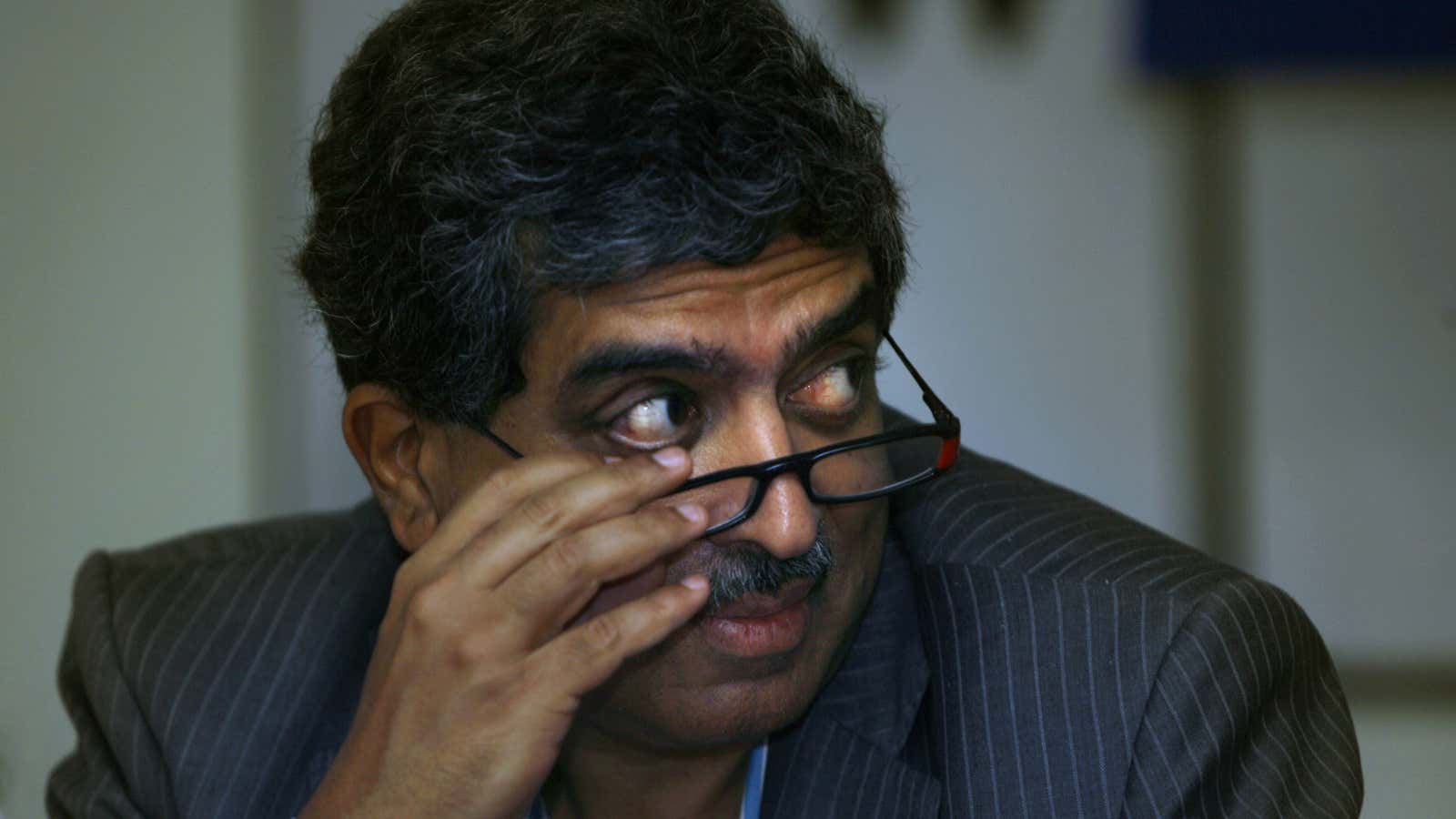“I’ll watch how Infosys is progressing…from outside.”
That’s how Infosys co-founder Nandan Nilekani wrapped up his farewell speech at the company’s Bengaluru headquarters on July 09, 2009. He was leaving the company after a 28-year stint to lead the Indian government’s Aadhaar programme.
Eight years later, the 62-year-old Indian Institute of Technology, Bombay, alumnus is back at the helm to watch over Infosys up-close.
On Aug. 24, Infosys appointed Nilekani (pdf) as its non-executive chairman, effective immediately. ”Nandan is the ideal leader for Infosys at this stage in the company’s development. His appointment will allow Infosys to focus on the strategic changes it needs to make in order to capitalise on the attractive opportunities in the years ahead,” said R Seshasayee, the company’s outgoing chairman.
Nilekani’s appointment comes weeks after a leadership turmoil sparked by the abrupt resignation of the company’s CEO and managing director, Vishal Sikka, following a rather public spat with the founders led by NR Narayana Murthy.
Nandan 1.0
Nilekani, along with six others, founded Infosys in 1981. He held several posts, including that of its president and chief operating officer.
He was the CEO between 2002 and 2007, some of the company’s best years (aided by favourable market conditions, of course). Under his leadership, revenue grew from Rs2,603.6 crore ($391.3 million) in 2002 (pdf) to Rs13,149 crore in 2007 (pdf).
In keeping with its tradition of giving all the co-founders a shot at the CEO’s position, Nilekani stepped down while still in top gear.
“Nandan has been hugely successful as a CEO. His strengths are big-picture thinking, simplification of complex ideas, and articulation,” Murthy had said (pdf) at the time when Nilekani stepped down.
Towards the end of his stint, Nilekani was the company’s co-chairman and a member of its board.
However, he wasn’t merely an in-house Infosys star.
In 1988, Nilekani co-founded India’s top IT industry body Nasscom. In recognition of his contribution to building India’s information technology sector, he was awarded the Padma Bhushan, one of India’s highest civilian honours, in 2006. He was even named among the world’s 100-most influential people by Time magazine in 2006 and 2009.
Chalo
Delhi
In 2009, Nilekani shed his “Infosys identity” to “give (an) identity to every Indian.”
Serving as the first chairman of the Unique Identification Authority of India (UIDAI), Nilekani held the rank of a cabinet minister. Over six years, he built what is perhaps the world’s biggest biometric system. Given the magnitude of the project, Nilekani received praise from global icons like Bill Gates and Satya Nadella.
Gradually, though, praise gave way to criticism; concerns began to be raised over privacy and possible surveillance by the government. There was also criticism over making Aadhaar mandatory for several government services and welfare schemes. Nevertheless, Nilekani managed to push ahead.
Impressed by this technology-intensive project, the Narendra Modi government roped him in to help with its Digital India initiatives, even though Modi and his Bharatiya Janata Party had opposed Aadhaar earlier.
Political stint
In 2014, Nilekani shifted track again. He joined mainstream politics and the Indian National Congress party, contesting the 16th Lok Sabha elections from the Bengaluru South constituency. He was one of the richest candidates in the race. He is currently India’s 80th richest man with a net worth of $1.72 billion.
Nilekani lost the election and hasn’t been active in mainstream politics since.
However, he’s been working behind the scenes for EkStep Foundation, a not-for-profit venture that uses technology to tackle challenges in primary education.
While he avoided commenting on Infosys since joining the government, he continued to hold his promoter’s stake. As of June 30, 2017, Nilekani and his family held 2.29% stake in the company.
Now, as its new non-executive chairman, it will be more than just commenting.
Nilekani had inspired the phrase “The world is flat.” Ironically, he has come a full circle.
